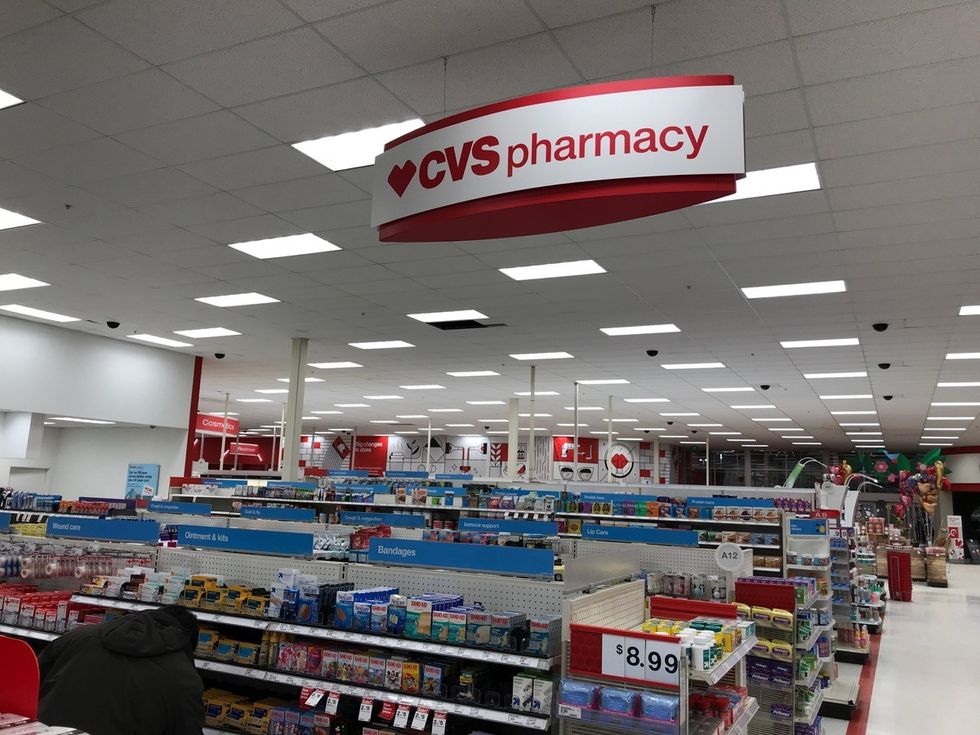Prescription medication is a necessity for so many of us—but while we understand why we need it, the question of how much it's going to cost remains more of a mystery. Even with insurance, prices can vary significantly, which can lead to some unpleasant surprises when checking out. Like other big-name pharmacies, CVS provides estimated costs via its mobile app, but soon you might start seeing different numbers when you check ahead of time and when you get to the register. Read on to find out how CVS is changing prescription costs, for better and for worse.
RELATED: Mucinex Is Being Pulled From Pharmacy Shelves, Outraged Shoppers Claim.
CVS is rolling out a new program.
 Shutterstock
ShutterstockIn a Dec. 5 press release, CVS introduced its new CostVantage program, described as "a more transparent and sustainable model for retail pharmacy."
Currently, pharmacy benefit managers (PBMs) dictate the prices consumers pay for drugs and the payments that pharmacies receive. According to CBS News, PBMs also negotiate the rebates from drug manufacturers to insurers. The reimbursement formulas are complicated and also aren't exclusively based on what the pharmacies spend on buying different drugs.
CostVantage will introduce a simpler model where PBMs reimburse pharmacies based on the amount CVS paid for the drugs, also including a "set markup" and fee for pharmacy services, per the company press release. The program is being phased in during the first half of 2024, with new prices first available for customers paying with a selection of drug discount cards, The Wall Street Journal reported.
“We are leading with an approach that will shift how our retail pharmacy is compensated by implementing a more transparent and sustainable model that fairly aligns pharmacy reimbursement to the quality services we provide,” Prem Shah, PharmD, executive vice president, chief pharmacy officer and president, Pharmacy and Consumer Wellness, CVS Health, said in the release. “It provides our PBM and payor clients a foundational step towards more pricing clarity for consumers.”
RELATED: Highly Effective New Weight Loss Drug Will Cost 20% Less Than Ozempic.
Consumers may see price drops as well as increases.
 Shutterstock
ShutterstockFor CVS customers—as well as employers and health insurers that pay for prescriptions—the effects will likely be mixed.
Some drugs might cost less, while others could become more expensive, CVS executives told the WSJ. However, on a positive note, execs also said that more prescriptions should show price decreases than increases.
In addition to prices more closely reflecting what pharmacies pay for the drugs, CVS told the WSJ that CostVantage will help eliminate discrepancies where insured patients learned they could be paying less for medication with cash or a drug discount card instead of going through their employers' coverage.
Best Life reached out to CVS for more information on how this initiative will affect the cost of prescriptions, and will update the story with its response.
RELATED: CVS and Walgreens Strikes Are Leaving Pharmacies Empty.
CVS' move is similar to Mark Cuban's existing model.
 Shutterstock
ShutterstockThe "cost plus" payment model CVS is using is also similar to entrepreneur Mark Cuban's company, Cuban's Cost Plus Drugs, which is direct-to-consumer and offers more transparency about drug pricing.
But with CVS—one of the largest retail pharmacies in the U.S.—making this move, the cost plus initiative becomes more mainstream.
“It’s a fundamental change in how pharmacy services are priced,” Adam Fein, chief executive of the Drug Channels Institute, told the WSJ, adding that it's “a legitimate step toward transparency.”
There are overarching concerns about drug pricing transparency.
 iStock
iStockAccording to the WSJ, CVS' move is partly in response to criticism from different parties about how drugs are bought and sold.
In fact, because the drug-pricing model is so secretive and lacks transparency, Congress has bills in play that would give consumers a better understanding of the process, CBS News reported.
“Transparency and clear pass-through pricing based on the actual cost of the drugs is exactly what we have been hoping the market will do,” Elizabeth Mitchell, chief executive of the Purchaser Business Group on Health, told the WSJ.





